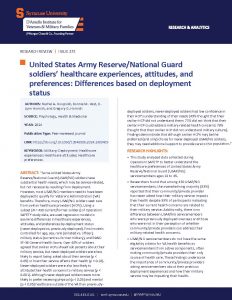ABSTRACT:
“Some United States Army Reserve/National Guard (USAR/NG) soldiers have substantial health needs, which may be service-related, but not necessarily resulting from deployment. However, most USAR/NG members need to have been deployed to qualify for Veterans Administration (VA) benefits. Therefore, many USAR/NG soldiers seek care from civilian healthcare providers (HCPs). Using a subset (N = 430 current/former soldiers) of Operation: SAFETY study data, we used regression models to examine differences in healthcare experiences, attitudes, and preferences by deployment status (never-deployed vs. previously-deployed). Final models controlled for age, sex, rank (enlisted vs. officer), military status (current vs. former military), and RAND SF-36 General Health Score. Over 40% of soldiers agreed that civilian HCPs should ask patients about their military service, but never-deployed soldiers were less likely to report being asked about their service (p < 0.05) or how their service affects their health (p < 0.10). Never-deployed soldiers were also less likely to attribute their health concerns to military service (p < 0.001). Although never-deployed soldiers were more likely to prefer receiving physical (p < 0.05) and mental (p < 0.05) healthcare outside of the VA than previously-deployed soldiers, never-deployed soldiers had low confidence in their HCP’s understanding of their needs (49% thought that their civilian HCP did not understand them; 71% did not think that their civilian HCP could address military-related health concerns; 76% thought that their civilian HCP did not understand military culture). Findings demonstrate that although civilian HCPs may be the preferred (and only) choice for never-deployed USAR/NG soldiers, they may need additional support to provide care to this population.”
RESEARCH HIGHLIGHTS
- This study analyzed data collected during Operation: SAFETY to better understand the healthcare preferences of United States Army Reserve/National Guard (USAR/NG) servicemembers ages 18 to 45.
- Researchers found that among 430 USAR/NG servicemembers, the overwhelming majority (83%) reported that their community/private provider has never asked how their military service impacts their health despite 39% of participants indicating that their current health concerns are related to their military service. Additionally, there is no difference between USAR/NG servicemembers who were previously deployed overseas and those who were not in their perception of whether community/private providers can address their military-related health concerns.
- USAR/NG servicemembers do not have the same eligibility criteria for VA health benefits as servicemembers from active components, often making community/private providers their only source of health care. These findings underscore the importance of community/private providers asking servicemembers about their previous deployment experiences and how their military service may be impacting their health.

